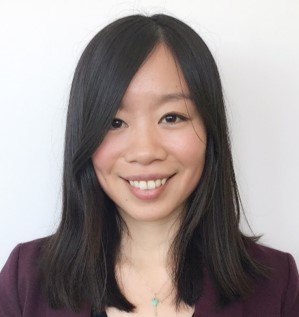Lulu Chu, PhD

Current job title: Associate Director
Institution: AstraZeneca
Degree, year of completion: PhD in BME, 2016
Why did you choose to attend Johns Hopkins?
Johns Hopkins BME and ICM provided research focuses on systems modeling, which was what I was interested in pursuing for my PhD research. In addition, the BME program had the rotation program for first year PhD students to explore.
Can you share any special memories from your time at JHU (in the classroom, lab, etc.)?
One special memory would be my linear dynamical systems class. The class started off with 15 people and over the course of the first few weeks, it dropped to 6 students. It was a hard class and the final exam was a 24-hour, take-home exam and the average grade was 26. The professor said he wanted us to understand that we still don’t know anything and there is still a ton to learn.
Another special memory was that my PhD research experience. My time at JHU was the time period where I was learning patch clamp experiments with our UMD collaborators for part of my thesis; Due to lack of support, I couldn’t achieve much by year four and it made me really frustrated. I started doubting what I was doing with my life and whether I was competent enough to continue… If it wasn’t for Dr. Winslow and Dr. Greenstein’s support, friends’ support, and Hopkins Dance, I may have quitted. But because of this process, I’ve learned to be persistent and to go against odds. It was an important life lesson for me.
How did you get interested in your current professional field? What interests or circumstance drew you to it?
I got an opportunity to do an internship with my current group/company in AstraZeneca and really liked the idea of applying quantitative tools to help bridge the translational science to early clinical setting, to help design clinical trials using simulations and to help patients.
Please describe some of your career highlights.
Within 2 years at AstraZeneca, I was nominated for company breakthrough scientist and got promoted to associate director recently. During this process, I initiated the development of more integrative, ‘drug-disease’ quantitative systems pharmacology models across therapy area, with outstanding results in a year. A highlight was the first time use of mechanistic disease model in late-stage projects to support FDA questions, manufacturing specifications and a new indication for a recently approved drug. In addition, I have been leading the efforts in interacting/influencing the important key stakeholders in the whole drug development pipeline within the company to promote the importance of mechanistic modeling in understanding the science.
What are your most notable/interesting professional (and/or personal) accomplishments?
I’ve grown a lot and built more confidence through grad school and experience in industry. I’ve doubted my ability and contributed a lot of what I have achieved to luck or help from others but I gradually learnt that those are something I have owned over time.
Do you have any advice to offer aspiring engineers?
Be ready to learn technical skills that you weren’t taught or trained in grad school; Soft skills are important in a highly complex organization.
Do you still feel connected to the Hopkins community? Would you like to be more involved?
Yes, somewhat connected. I still stay in touch with Dr. Winslow and my lab mates as most of us are in Boston area. Yes, I would like to be involved.


